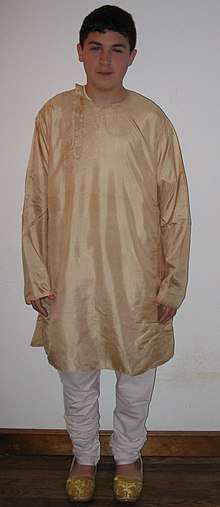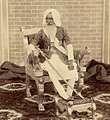Churidar
Churidar, or more properly churidar pyjama is tightly fitting trouser worn by both men and women in the Indian subcontinent. Churidar are a variant of the common shalwar pants. Shalwars are cut wide at the top and narrow at the ankle. Churidars narrow more quickly, so that contours of the leg are revealed. They are usually cut on the bias, making them naturally stretchy. Stretch is important when pants are closefitting. They are also longer than the leg and sometimes finish with a tightly fitting buttoned cuff at the ankle. The excess length falls into folds and appears like a set of bangles resting on the ankle (hence 'churidar'; 'churi': bangle, 'dar': like). When the wearer is sitting, the extra material is the "ease" that makes it possible to bend the legs and sit comfortably. The word churidar is from Urdu and made its way into English only in the 20th century.[1] Earlier, tight fitting churidar-like pants worn in India were referred to by the British as Moghul breeches, long-drawers, or mosquito drawers.[2]
The churidar is usually worn with a qameez (tunic) by women or a kurta (a loose overshirt) by men, or they can form part of a bodice and skirt ensemble.
Gallery
 Portrait of Kashmiri children wearing churidar pyjamas circa 1890
Portrait of Kashmiri children wearing churidar pyjamas circa 1890 19th century painting of Indian women wearing transparent skirts over churidar pants
19th century painting of Indian women wearing transparent skirts over churidar pants Cotton churidar worn with silk side-opening kurta and mojari shoes
Cotton churidar worn with silk side-opening kurta and mojari shoes A woman visiting Bangladesh wearing a churidar
A woman visiting Bangladesh wearing a churidar Jawaharlal Nehru, prime minister of India, dressed in churidar being received by American president Harry S. Truman upon arrival at the National Airport, Washington DC, October 1949
Jawaharlal Nehru, prime minister of India, dressed in churidar being received by American president Harry S. Truman upon arrival at the National Airport, Washington DC, October 1949 Muhammad Ali Jinnah, the founder of Pakistan, center, and Liaquat Ali Khan, its first prime minister, extreme left, both in churidars, at the All-India Muslim League Working Committee meeting in Lahore, March 1940
Muhammad Ali Jinnah, the founder of Pakistan, center, and Liaquat Ali Khan, its first prime minister, extreme left, both in churidars, at the All-India Muslim League Working Committee meeting in Lahore, March 1940 Portrait of the son of H.H. Chunnasee Rajoonath Pant (wearing churidars). 1860. Oriental and India Office Collection, British Library.
Portrait of the son of H.H. Chunnasee Rajoonath Pant (wearing churidars). 1860. Oriental and India Office Collection, British Library. Portrait of Sir Hira Singh, Raja of Nabha, Punjab, in churidars. c. 1890. Oriental and India Office Collection, British Library.
Portrait of Sir Hira Singh, Raja of Nabha, Punjab, in churidars. c. 1890. Oriental and India Office Collection, British Library.
See also
- Salwar kameez
- Jammu dress
- Kandura
References
- Hawkins, R. E. 1984. Common Indian words in English. Oxford University Press, New Delhi.
- Yule, Henry and A. C. Burnell. 1903. Hobson-Jobson: A Glossary of Colloquial Anglo-Indian Words and Phrases, and of Kindred Terms, Etymological, Historical, Geographical and Discursive. London: John Murray. 1021 pages.